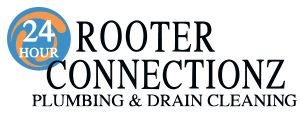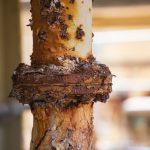Time and simple wear-and-tear pose threats to various plumbing systems in your home, and a good example here is corrosion that may show up in certain pipes. Corrosion can be caused by several different factors, and leads to issues in both your pipes and the water they transport throughout your plumbing system — but it can also be prevented or remedied if you’re paying attention in the right areas.
At 24 Hour Rooter Connectionz, we’re happy to offer numerous services that assist with problems in your pipes and drains, from simple drain cleaning up through main sewer line repair and replacement. We’ve helped many clients deal with corrosion and other risks to their drains or other pipe systems, and we’ll do the same for you if you’re experiencing these issues. Here’s a primer on how pipe corrosion happens, how it affects you water and your plumbing, and how you can prevent and/or remove corrosion concerns from any part of your plumbing setup.
Pipe Corrosion Basics and Causes
Corrosion refers to an exchange of electrons, one that creates wear-and-tear on a molecular level. When it becomes significant enough, it will lead to visible concerns like rust, clogs and leaks. It can happen in various different pipe materials, from copper to cast iron.
Corrosion can arise from a number of sources, including:
- Low PH: PH levels under 7 indicate acidic water, and this can lead to corrosion of your pipes.
- Excessive heat: Temperature changes in the liquid passing through a pipe will impact areas where metal has started to erode due to corrosion.
- The deposition of minerals: Chlorides, sulfates and carbonates can all cause erosion of the metal in your pipes.
- High quantities of oxygen: Oxygen in normal levels isn’t a problem for pipes, but high concentrations can lead to corrosion through oxidization.
- Electrical currents: In other cases, ungrounded electrical currents can create corrosion.
- Water velocity: Water traveling at a very high velocity, especially if it’s hot, may wear down or corrode pipes earlier than expected.
Impact of Corrosion on Water
Corrosion may affect your actual water supply in various ways, including:
- A change in taste: Corrosion may lead to the formation of iron bacteria, which can affect the taste of your water.
- Contamination with other substances: Pipes that are corroding and leaking can allow contaminants into your supply, potentially leading to sewage issues or other concerns as well.
- Unusual cloudiness: Cloudy or murky water may indicate that corrosion is becoming an issue for your pipes.
- Health issues: In the worst cases, corrosion leads to contamination that, in turn, can cause health problems in humans or pets.
Now, which of these impacts actually takes place will depend in some part on the pipe material in question. Iron pipes, for interest, may turn your water a different color or change its taste when they’re corroded, but will not pose any health risks; lead pipes, on the other hand, pose significant health concerns when they’re corroded, one of the main reasons they’re less popular today.
Impact of Corrosion on Plumbing
And while the impact on your water is obviously of major concern in many cases of corrosion, this isn’t even the full extent of the problem. Rather, water pipe corrosion also causes several major issues to your pipes and other plumbing system components, including:
- Erosion of the pipe itself: Corroding iron or steel pipes will deteriorate over time.
- Leaking: This is especially common in corroded areas where water has become trapped, and can lead to flooding of your floors and other issues.
- Increased water pressure: Water velocity increases as pipes corrode, leading to pressure concerns that may lead to burst pipes.
- Mold or mildew growth: Leaking and trapped water can lead to excess moisture, which in turn can create the perfect environment for mold growth.
Preventing Pipe Corrosion
Luckily, there are some very basic steps you can take to prevent corrosion from taking place in your pipes before it ever becomes a problem. The simplest method is through basic water testing, in which you can determine the PH levels of your water. If levels are under 7, as we noted above, there’s a good chance your pipes are corroded and there’s too much acidity in your water supply — and you can get right to work removing this corrosion before it worsens.
Even if PH level is not under 7, you’ll still want to consider using a water softener in order to prevent further corrosion before it takes place. And if you actually have acidic water at any point, consider using a reverse osmosis system or just buying a lot of bottled water for drinking and cooking purposes — you may not be able to solve the corrosion problem itself, but you can at least prevent other problems from taking place.
Remedying Pipe Corrosion
The best time to address a potential corrosion problem with your pipes is before it happens, of course. But there are some steps that can help in more serious cases of corrosion, as well. The simplest task here is to clean pipes of any visible corrosion, but this will only have so much of an impact.
One additional option here is to use a trenchless pipe repair system, which allows professionals to conduct repairs without needing to dig up or otherwise disrupt your pipes. These are great in many situations because they don’t require any of the additional damage and secondary issues that come with more invasive methods; however, they often do require professional assistance in order to get the job done, and may not be suitable for certain types of pipe.
Another option is an epoxy lining system, which can be used to coat corroded sections of your iron or steel pipes, creating a new protective barrier that ensures against further corrosion. Again, these are typically best left to the pros unless you have experience with similar solutions.
For more on avoiding corrosion concerns in your water pipes, or to learn about any of our drain cleaning or other services, speak to the staff at 24 Hour Rooter Connectionz today.


